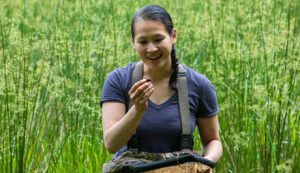 The COVID-19 pandemic interrupted research activities on campus, as it did so many other aspects of University life.
The COVID-19 pandemic interrupted research activities on campus, as it did so many other aspects of University life.
Most research facilities closed March 21 to activities that were not deemed essential, though coronavirus-related projects continued.
The Division of Research held a series of town hall meetings via Zoom beginning in April. These offered faculty and staff members an opportunity to ask questions and share concerns. By early May, a Return to Research subcommittee with significant faculty participation began meeting. That group, in consultation with Environmental Health and Safety experts and the Public Health Advisory Committee, created protocols that continue to govern Binghamton’s return to research, including a maximum occupancy of one person per 200 square feet.
Principal investigators were able to apply to go back to campus beginning in mid-May. Most projects had resumed at least some activities before the fall semester began.
David Jentsch, professor of psychology, put particular emphasis on self-care as he worked with members of his lab to resume their experiments. “We have to be mindful of the fact that people are bringing a lot of trauma back to work with them,” he says. “At the same time, for a lot of researchers, work is part of a habit and a ritual that gives us comfort and structure.”
Adjusting to new safety protocols is fairly straightforward, Jentsch says. But it’s harder to address the many uncertainties surrounding this academic year and to support students and colleagues who face a whole spectrum of challenges beyond campus.
By early September, about 220 applications and modification forms from nearly 150 faculty members had been reviewed, according to Nancy Lewis, assistant vice president for research compliance. More than 670 faculty and staff members as well as students from 42 departments were able to return to laboratories and other research spaces.
“To date, we have zero reported cases of COVID-19 in any of the labs,” says Bahgat Sammakia, vice president for research. He notes that research grant applications and committed funds are up significantly year over year.
Some Binghamton researchers adjusted their approach to existing projects. Jessica Hua, associate professor of biological sciences, arranged her students’ summer schedules so they spent more time on fieldwork and less time in the lab, for example.
One project was supposed to examine fertilizers’ impact on pond environments. Instead of being simulated in petri dishes, the study was conducted outdoors. Another group was supposed to study light pollution and its effect on amphibians. “Instead of conducting lab experiments that isolate just light as the factor,” Hua says, “we shifted our focus to outdoor studies that test the consequences of light pollution in more realistic scenarios.”
Binghamton faculty are also pursuing projects related to the pandemic, ranging from developing PPE that also serves as a diagnostic tool to research related to drug discovery.
And the campus continues to serve as a host for international conferences and seminars, with hundreds of people from around the world attending a Zoom-based Center of Excellence program in July and a workshop on Gandhi and Martin Luther King Jr. in September.
The Division of Research has conducted two surveys related to the Return to Research process. The first asked faculty about their experience; the second focused on division staff and remote work. About 58% of faculty described the process as easy or very easy; 97% said they were confident they were meeting safety standards. Meanwhile, about 75% of Division of Research staff said they feel just as productive while working remotely.







